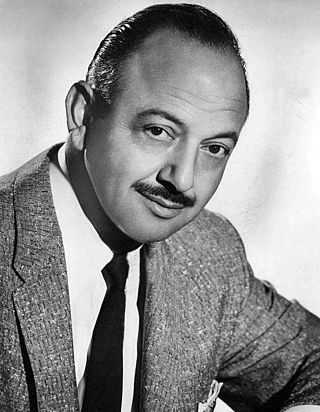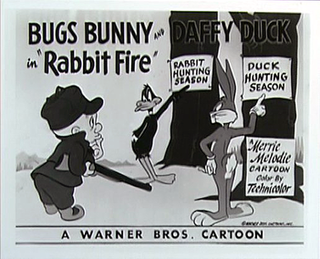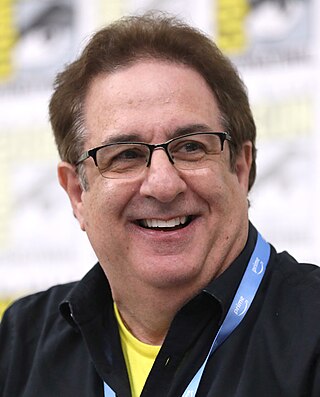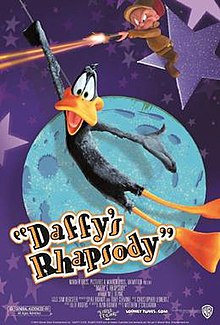
Melvin Jerome Blanc was an American voice actor and radio personality whose career spanned over 60 years. During the Golden Age of Radio, he provided character voices and vocal sound effects for comedy radio programs, including those of Jack Benny, Abbott and Costello, Burns and Allen, The Great Gildersleeve, Judy Canova, and his own short-lived sitcom.

Bugs Bunny is a fictional character created in the late 1930s at Warner Bros. Cartoons and voiced originally by Mel Blanc. Bugs is best known for his featured roles in the Looney Tunes and Merrie Melodies series of animated short films, produced by Warner Bros. Earlier iterations of the character first appeared in Ben Hardaway's Porky's Hare Hunt (1938) and subsequent shorts before Bugs's definitive characterization debuted in Tex Avery's A Wild Hare (1940). Bob Givens, Chuck Jones, and Robert McKimson are credited for defining Bugs's design.

Looney Tunes is an American animated franchise produced and distributed by Warner Bros. It began as a series of short films that originally ran from 1930 to 1969, concurrently with its partner series Merrie Melodies, during the golden age of American animation. Following a revival in the late 1970s, new shorts were released as recently as 2014. The two series introduced a large cast of characters, including Bugs Bunny, Daffy Duck, and Porky Pig. The term Looney Tunes has since been expanded to also refer to the characters themselves.

Daffy Duck is a fictional character created by animators Tex Avery and Bob Clampett for Leon Schlesinger Productions. Styled as an anthropomorphic black duck, he has appeared in cartoon series such as Looney Tunes and Merrie Melodies, in which he is usually depicted as a foil for either Bugs Bunny, Porky Pig or Speedy Gonzales. He was one of the first of the new "screwball" characters that emerged in the late 1930s to replace traditional everyman characters who were more popular earlier in the decade, such as Mickey Mouse, Porky Pig, and Popeye.

Porky Pig is an animated character in the Warner Bros. Looney Tunes and Merrie Melodies series of cartoons. He was the first character created by the studio to draw audiences based on his star power, and the animators created many critically acclaimed shorts featuring the character. Even after he was supplanted by later characters, Porky continued to be popular with moviegoers and, more importantly, the Warners directors, who recast him in numerous everyman and sidekick roles.

Sylvester J. Pussycat Sr. is a fictional character, an anthropomorphic cat in the Looney Tunes and Merrie Melodies series of cartoons. Most of his appearances have him often chasing Tweety Bird, Speedy Gonzales, or Hippety Hopper. He appeared in 103 cartoons in the golden age of American animation, lagging only behind superstars Bugs Bunny, Porky Pig, and Daffy Duck. Three of his cartoons won Academy Awards, the most for any starring a Looney Tunes character: they are Tweetie Pie, Speedy Gonzales, and Birds Anonymous.

Merrie Melodies is an American animated comedy short film series distributed by Warner Bros. Pictures. It is the companion series to Looney Tunes, and featured many of the same characters as the former series. It originally ran from August 2, 1931, to September 20, 1969, during the golden age of American animation, though it had been revived in 1979, with new shorts sporadically released until June 13, 1997. Originally, Merrie Melodies placed emphasis on one-shot color films in comparison to the black and white Looney Tunes films. After Bugs Bunny became the breakout character of Merrie Melodies and Looney Tunes transitioned to color production in the early 1940s, the two series gradually lost their distinctions and shorts were assigned to each series randomly.
Box-Office Bunny is a 1991 Looney Tunes short film directed by Darrell Van Citters and starring Bugs Bunny, Daffy Duck and Elmer Fudd. It was shown in theaters alongside The NeverEnding Story II: The Next Chapter, as well as on the subsequent home media releases for the film. It is Warner Bros.'s first Bugs Bunny theatrical release since 1964's False Hare. It was issued to commemorate Bugs' 50th anniversary and is included as a special feature on the DVD for The Looney, Looney, Looney Bugs Bunny Movie. The short marks the debut of Jeff Bergman as the voice of Bugs, Daffy, and Elmer, following the death of Mel Blanc on July 10, 1989.

Rabbit Fire is a 1951 Looney Tunes cartoon starring Bugs Bunny, Daffy Duck, and Elmer Fudd. Directed by Chuck Jones and written by Michael Maltese, the cartoon is the first in Jones' "hunting trilogy"—the other two cartoons following it being Rabbit Seasoning and Duck! Rabbit, Duck! It is also the first cartoon to feature a feud between Bugs and Daffy. Produced by Edward Selzer for Warner Bros. Cartoons, Inc., the short was released to theaters on May 19, 1951 by Warner Bros. Pictures and is often considered among Jones' best and most important films.

Rabbit Seasoning is a 1952 Warner Bros. Merrie Melodies cartoon directed by Chuck Jones. Released on September 20, 1952, the short stars Bugs Bunny, Daffy Duck and Elmer Fudd.

Duck! Rabbit, Duck! is a 1953 Warner Bros. Merrie Melodies cartoon directed by Charles M. Jones. The cartoon was released on October 3, 1953 and stars Bugs Bunny, Daffy Duck and Elmer Fudd.

The Scarlet Pumpernickel is a 1950 Warner Bros. Looney Tunes theatrical cartoon short, directed by Chuck Jones and written by Michael Maltese. The cartoon was released on March 4, 1950, and features Daffy Duck, along with a number of Looney Tunes stars, including the introduction of Melissa Duck. The title is a play on the 1905 novel The Scarlet Pimpernel.

Jeffrey Bergman is an American voice actor and impressionist who has provided the modern-day voices of various classic cartoon characters, most notably with Looney Tunes and Hanna-Barbera.
Beanstalk Bunny is a 1955 Warner Bros. Merrie Melodies cartoon directed by Chuck Jones. The short was released on 12 February 1955, and stars Bugs Bunny, Daffy Duck and Elmer Fudd. The cartoon's story is derived from the fairy tale "Jack and the Beanstalk".

This Is a Life? is a 1955 Warner Bros. Merrie Melodies animated cartoon directed by Friz Freleng, written by Warren Foster, and produced by Edward Selzer, with music directed by Milt Franklyn. The short was released on July 9, 1955, and stars Bugs Bunny. The voices were performed by Mel Blanc, Arthur Q. Bryan, and June Foray in her first work for Warner Bros. This is one of the few Bugs Bunny cartoons whose title does not contain Bugs, bunny, rabbit/wabbit or hare.

Elmer J. Fudd is an animated cartoon character in the Warner Bros. Looney Tunes/Merrie Melodies series and the archenemy of Bugs Bunny alongside Yosemite Sam. His aim is to hunt Bugs, but he usually ends up seriously injuring himself and other antagonizing characters. He speaks in an unusual way, replacing his Rs and Ls with Ws, so he often refers to Bugs Bunny as a "scwewy" or "wascawwy (rascally) wabbit". Elmer's signature catchphrase is, "Shhh. Be vewy vewy quiet, I'm hunting wabbits", as well as his trademark laughter.
This is a listing of all theatrical animated shorts released by Warner Bros. under the Looney Tunes and Merrie Melodies banners between 1970 and the present. It also lists shorts originally planned for theatrical release and other shorts that were not feature films, television series, or television specials.














